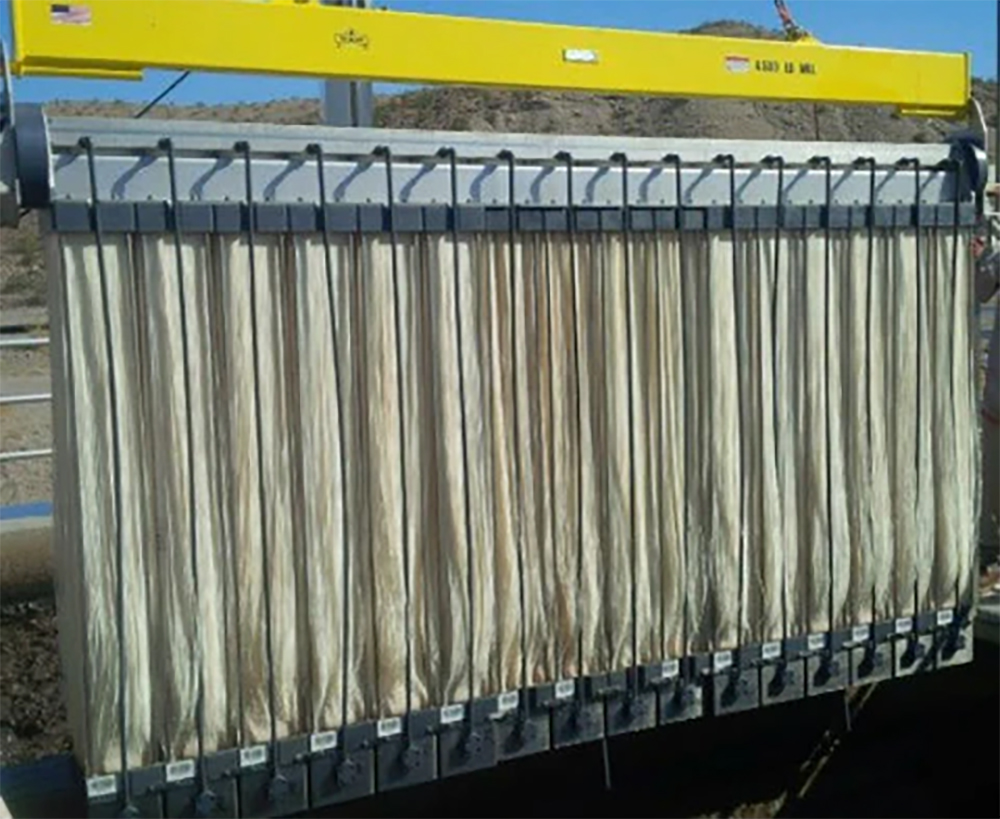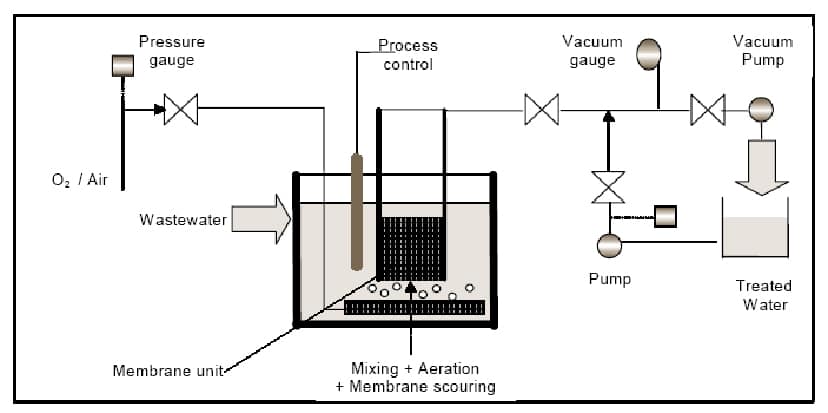How Membrane Bioreactor Can Help Meet Stringent Environmental Regulations
How Membrane Bioreactor Can Help Meet Stringent Environmental Regulations
Blog Article
The Advantages of Membrane Layer Bioreactors in Lasting Wastewater Administration
Membrane layer bioreactors (MBRs) stand for a crucial innovation in lasting wastewater administration, properly combining biological therapy with advanced membrane layer purification innovation. As the need for lasting services escalates, exploring the complex benefits of MBRs might reveal unanticipated implications for the future of wastewater treatment systems.
Review of Membrane Bioreactors
Membrane bioreactors (MBRs) stand for a significant development in wastewater treatment modern technology, integrating organic deterioration with membrane purification to improve the effectiveness of the therapy procedure. This innovative system integrates the advantages of conventional activated sludge processes with membrane technology, enabling improved solid-liquid separation. MBRs make use of semi-permeable membranes to different treated water from biomass, leading to high-quality effluent that can be recycled or safely released into the environment.
The operational design of MBRs usually includes a bioreactor where microbes damage down organic issue, followed by a membrane unit that filterings system the combined alcohol. This configuration not only decreases the footprint of the therapy facility yet additionally allows for higher biomass focus and lowered hydraulic retention times. Moreover, MBRs are capable of dealing with a larger variety of contaminants, consisting of pathogens and nutrients, making them appropriate for various applications, from municipal wastewater therapy to industrial effluent processing.
The combination of MBRs into wastewater monitoring systems is a sign of a growing pattern towards reliable and sustainable techniques in environmental design. Their capability to produce premium effluent while minimizing area requirements settings MBR innovation as an essential gamer in contemporary wastewater treatment remedies.
Boosted Effluent High Quality

The membrane filtration process serves as a physical barrier, allowing the retention of microorganisms and particle issue, which contributes to a more clear and cleaner effluent (Membrane Bioreactor). MBRs operate at higher biomass concentrations than traditional turned on sludge systems, advertising a lot more effective biodegradation of pollutants. This results in a decrease in biochemical oxygen demand (BODY) and total suspended solids (TSS) degrees in the final effluent
Additionally, MBRs demonstrate superb efficiency in dealing with difficult wastewater compositions, such as industrial effluents and wastewater with high nutrient lots. Consequently, the effluent created is frequently of greater quality, enabling for even more flexible disposal alternatives and reduced environmental effect. Inevitably, the improved effluent top quality accomplished with MBR technology highlights its essential function beforehand lasting wastewater monitoring techniques.
Water Reuse Opportunities
The top notch effluent produced by membrane layer bioreactors (MBRs) opens significant possibilities for water reuse in numerous applications. MBRs effectively get rid of pollutants, including microorganisms, put on hold solids, and natural issue, leading to cured water straight from the source that satisfies or goes beyond governing standards for reuse. This quality permits the execution of water reusing campaigns throughout diverse markets.
One popular application is in agriculture, where dealt with wastewater can be made use of for irrigation, promoting sustainable farming practices while preserving freshwater resources. In addition, MBR-treated effluent can be utilized for industrial procedures such as cooling, cleaning, and as a process water source, significantly reducing the demand for safe and clean water in these procedures.
In metropolitan atmospheres, MBRs assist in the usage of reclaimed water for landscape irrigation, commode flushing, and other non-potable uses, adding to the overall resilience of water supply systems. The combination of MBR innovation in decentralized systems aids in taking care of localized water needs, especially in water-scarce regions.
Reduced Environmental Impact
Exactly how can the fostering of membrane bioreactors (MBRs) add to a minimized environmental influence in wastewater administration? MBRs significantly enhance the therapy performance of wastewater while minimizing eco-friendly disruptions. Membrane Bioreactor.
Furthermore, MBRs run at reduced hydraulic retention times compared to conventional systems, leading to smaller sized treatment plant impacts. This compact layout lowers land usage, therefore protecting all-natural habitats and biodiversity. The procedure also generates check it out much less sludge than traditional methods, mitigating disposal obstacles and decreasing greenhouse gas discharges connected with sludge management.
In addition, MBRs help with the recuperation of valuable sources, such as water and nutrients, contributing to a round economic situation. By allowing water reuse for irrigation or commercial processes, MBRs help alleviate freshwater scarcity, therefore promoting lasting water utilize methods. Eventually, the fostering of MBR technology stands for a significant stride in the direction of lessening the environmental impact of wastewater management systems.
Financial Benefits of MBRs

Furthermore, MBRs help with the manufacturing of premium effluent, which can be recycled for numerous applications, such as farming irrigation and industrial procedures - Membrane Bioreactor. This reuse ability can substantially reduce water purchase costs, offering a financial reward for industries facing rigid water regulations
The portable design of MBR systems additionally causes reduced land needs, which is especially valuable in urban areas where realty is costly. By minimizing area, towns and sectors can save money on land procurement and upkeep expenses.
Moreover, MBRs frequently need less constant upkeep and have a longer lifespan than conventional systems, additionally adding to set you back financial savings. In recap, the economic benefits of MBRs-- ranging from decreased operational costs to land cost savings and effluent reuse-- make them a compelling option for lasting wastewater monitoring, offering both prompt and long-lasting economic advantages.
Final Thought
Membrane bioreactors represent a transformative approach to sustainable wastewater monitoring, combining biological therapy with sophisticated membrane layer purification for superior effluent quality. Their capability for efficient contaminant removal index assists in water reuse, thus preserving crucial freshwater resources. Furthermore, MBRs add to reduced environmental impacts with portable designs and lower sludge generation. Economic benefits additionally enhance their practicality, making MBRs an encouraging solution for resolving the difficulties of wastewater treatment and promoting sustainable resource administration.
Membrane bioreactors (MBRs) stand for a crucial development in sustainable wastewater administration, properly merging organic therapy with advanced membrane layer purification technology.Membrane layer bioreactors (MBRs) represent a significant development in wastewater therapy technology, incorporating organic deterioration with membrane filtration to improve the efficiency of the therapy process.Accomplishing enhanced effluent high quality is one of the most substantial advantages of making use of membrane bioreactors (MBRs) in wastewater treatment.Furthermore, MBRs demonstrate superb efficiency in dealing with tough wastewater compositions, such as commercial effluents and wastewater with high nutrient loads.Incorporating membrane layer bioreactors (MBRs) right into wastewater monitoring not just lowers environmental influence however likewise provides considerable financial advantages.
Report this page